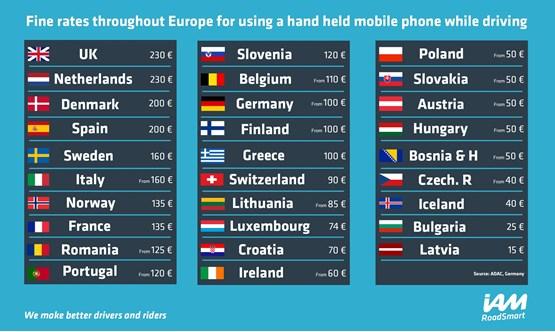France Introduces €200 Fine for Speaking Too Loudly on Mobile Phones
In a bold move aimed at curbing public disturbances, France has introduced a new regulation imposing a €200 fine on individuals who engage in loud conversations on mobile phones in public spaces. This decision, which has sparked a wave of debate among citizens and policymakers alike, reflects the government’s commitment to promoting a more respectful and tranquil urban environment. As cities grapple with the challenges of noise pollution and public etiquette, this initiative seeks not only to enhance the quality of life for residents but also to set a precedent for collective consideration in communal areas. This article delves into the implications of the new regulation and the reactions it has generated across the nation.
France’s New Law on Mobile Phone Noise Aims to Curb Public Disturbance
In a bid to enhance public tranquility, France has enacted a controversial law imposing a fine of up to €200 for individuals who speak too loudly on their mobile phones in public spaces. This legislation aims to address the growing concerns about noise pollution in crowded areas such as public transport, parks, and restaurants. Officials argue that the law will create a more pleasant environment for everyone, promoting courtesy and consideration among citizens.
As residents have taken to social media to voice their opinions, the reactions have been mixed. While some applaud the efforts to reduce noise disturbances, others view it as an infringement on personal freedoms. Key aspects of the law include:
- Targeted Areas: Public transport, parks, and marketplaces.
- Enforcement: Local authorities will patrol high-traffic areas.
- Warnings: First-time offenders may receive a warning instead of an immediate fine.
Implications for Daily Life in France and Tourist Experiences
The recent introduction of a €200 fine for loud mobile phone conversations is set to reshape both daily life in France and the experiences of tourists visiting the country. Locals might find a new level of public decorum creeping into cafés, parks, and public transportation as the social norm shifts away from the casual loudness often seen in urban settings. This law aims not only to curb noise pollution but also to enhance the quality of public spaces, paving the way for more serene environments. Residents may now embrace a quieter lifestyle, leading to enhanced community interactions and a more tranquil city ambiance.
For tourists, navigating this new landscape means being more mindful of their phone usage while in public areas. It is crucial for visitors to adapt if they want to fully enjoy their French experience without facing potential fines. Key adjustments may include:
- Voice Modulation: Lowering volumes during conversations.
- Designated Areas: Seeking out areas where phone use is acceptable.
- Awareness: Observing local customs regarding phone etiquette.
As the law takes effect, it may also contribute to the charm of French culture, providing an opportunity for deeper engagement with locals, who can share insights about traditional communication styles. In turn, this focus on quieter public spaces could attract a different type of traveler, one who values the peaceful ambiance that France is known for.
Expert Opinions on Noise Pollution and Its Impact on Society
In an innovative yet controversial move, France has set forth a €200 fine for individuals who speak excessively loudly on mobile phones in public spaces. This decision comes in response to the escalating concerns surrounding noise pollution, which experts argue is not merely an annoyance but has profound implications for societal well-being. Studies have shown that sustained exposure to high noise levels can lead to significant health issues, including increased stress, disrupted sleep patterns, and even cardiovascular problems. Consequently, the French government seeks to restore a semblance of tranquility in crowded urban environments.
Experts emphasize the need for a cultural shift regarding noise awareness. They suggest that while enforcing fines may provide immediate relief, fostering a collective responsibility towards maintaining a peaceful atmosphere is crucial. Effective strategies might include:
- Public Awareness Campaigns: Educating citizens about the effects of noise pollution on health.
- Designated Quiet Zones: Establishing areas in urban centers where silence is expected and enforced.
- Community Engagement: Involving residents in discussions about noise levels and acceptable behaviors in public spaces.
Such measures could serve not only to reduce noise but also to enhance the overall quality of life for urban dwellers, promoting a more harmonious coexistence in increasingly congested areas.
Practical Tips for Navigating the Fine in Public Spaces
To avoid the hefty €200 fine for loud phone conversations in public spaces, it’s essential to adopt mindful communication practices. Here are a few approaches that can help maintain a lower volume:
- Choose Your Location Wisely: Opt for quieter areas when engaging in phone calls, such as parks or cafes where ambient noise can be more forgiving.
- Use Headphones: Utilizing headphones or a hands-free device can help contain your voice and reduce the need to speak loudly.
- Mind Your Emotions: Be conscious of your tone and volume, especially in heated discussions. Keeping your voice steady can prevent unnecessary noise.
While managing phone conversations, being aware of your surroundings is crucial. Consider the following tips:
| Consideration | Action |
|---|---|
| Crowded Places | Speak softly or wait until you find a quieter spot. |
| Public Transport | Keep conversations brief; use text messages when possible. |
| Dining Areas | Limit phone calls to avoid disrupting others’ dining experiences. |
Key Takeaways
In conclusion, France’s recent decision to impose a €200 fine for excessive noise from mobile phone conversations underscores the nation’s commitment to maintaining public tranquility. This measure, aimed at fostering a more considerate urban environment, reflects broader societal values related to noise pollution and community respect. As cities around the world grapple with similar issues, France’s approach may serve as a model for balancing personal freedoms with the well-being of the public space. While reactions to the policy continue to evolve, its implementation will likely spark discussions on the intersection of technology, etiquette, and legislative measures in our increasingly connected lives. Observers will be keen to see how this initiative shapes not only the behavior of mobile users but also the wider cultural landscape in urban France.



